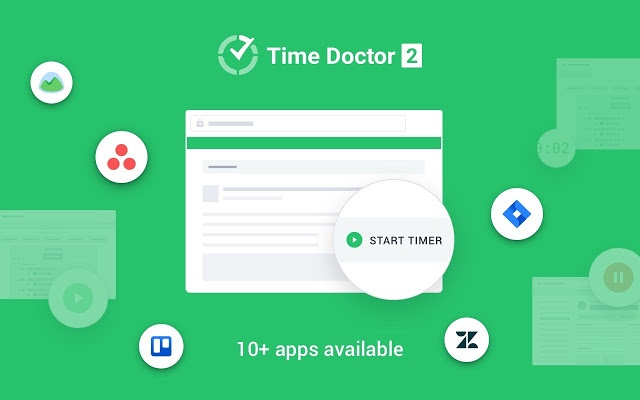No time management app or technique can help you manage your time better if you don’t have the necessary time management skills. And employees having exceptional time management skills are more efficient, productive, and more likely to succeed at work.
The trick lies in effective task management and using your time efficiently to get more things done each day. And though it sounds simple, it’s much harder to execute.
In this article, we’ll discuss the basic principles of time management skills and tips on how to improve them. We’ll also explore the top benefits of developing good time management skills.
This Article Covers:
(Click on a link below to jump to a specific section)
Let’s get started.
5 basic principles of time management skills
Time management skills are crucial because they help you set goals for yourself and finish urgent tasks.
But what foundation should you build your time management skills on?
Here are some basic principles of time management skills.
1. Organization
By staying organized, you can get a clear picture of what you need to finish and when.
Staying organized means you need to:
- Maintain an up-to-date calendar of your upcoming events.
- Have a neat and organized working environment.
- Manage folders for locating documents quickly.
- Take detailed notes.
2. Prioritization
For successful time management, you need to assess the importance of each task and attend to them as per their level of urgency.
You may use a time management methodology like the Eisenhower Matrix that divides tasks based on their importance. Or you may implement the time management system of Getting Things Done, which can help you get the important tasks out of your head onto a notepad to understand the priority levels of each assignment.
3. Communication
It’ll be much easier to work and collaborate with your colleagues if you develop strong communication skills.
It’s a soft skill that allows you to delegate tasks to your colleagues without friction. For example, if you have too much work on your plate, you can use your communication skill to assign some tasks to your colleagues or ask for additional resources to finish your tasks.
4. Planning
Careful planning can prepare you for any unforeseen and challenging task you may encounter in your workday. It helps you take note of your most vital objectives before you start the day.
Planning out your meetings, client work, and how you’ll accomplish things will help you stick to your schedule and adhere to deadlines.
5. Delegation
Efficient time managers finish their work early and help their company achieve smaller goals and more significant objectives by quickly delegating tasks. This skill is crucial for effective project management and decision-making.
If you’re a manager or a supervisor, you should delegate tasks to people with complementary skills. Additionally, if you’re a junior or a new employee, you can finish your tasks and assist others in fast-tracking the entire project.
Next, we’ll delve into some essential time management tips.
10 effective tips on how to improve time management skills
Here are 10 tips on how to improve your time management strategies.
1. Start early
Many successful leaders have one thing in common – they start their day early. It allows them to think and plan for their day.
Most people tend to be highly energetic in the morning. But, as the day progresses, your energy level dips, affecting your productivity, morale, and focus.
That’s why you need to finish your primary tasks as early as possible. It allows you to save enough time for the rest of the day and attend to your low-priority duties.
However, if you don’t like working in the morning, you can spend your mornings exercising or following some other healthy routine. This kind of schedule helps you stay energized throughout the day and allows you to put your best foot forward at work.
2. Overcome procrastination
Procrastination can not only kill personal productivity but can have a negative impact on teamwork and project progress as well.
People often procrastinate when they’re unwilling to take on a challenge or are afraid of failure.
To avoid procrastination and boost your work motivation, you can break up your daily activities into smaller, fun chores throughout the day. It can help you to stay on track and manage time better.
3. Align your goals
Individuals who align their daily objectives with project needs and business outcomes are better at time management.
To start with, you need to set realistic and achievable goals. You can use the SMART goals method while setting goals:
- Specific.
- Measurable.
- Attainable.
- Relevant.
- Timely.
This way, you’ll constantly push yourself to accomplish the bigger targets and manage time better by setting goals.
4. Manage your calendar
Not managing your work schedule on the calendar is a sign of poor time management. You can use the calendar to set time aside for your most important tasks to deliver them on time.
It lets you block specific periods during the day daily to avoid distractions in the form of unproductive meetings. You can decline unnecessary meeting invites and use that time to focus on your work and meet your deadlines instead.
It will help you focus on your most important tasks without interruptions, thus saving time.
5. Determine your priorities
Here’s a crucial time management tip to always keep in mind – organize and attend to your individual tasks based on their urgency.
You need to look at your daily tasks to determine which tasks require your immediate attention, and you should finish right away. It would be best to avoid starting another task until you finish the current one.
And if a specific task isn’t that important, you can set it aside for later.
It ensures that you finish all your urgent tasks first and don’t struggle to meet your deadlines. It allows you to meet all your targets in a given time frame and manage your time better.
6. Avoid multitasking
Many people believe that multitasking is the best way of getting things done quickly. But we do better when we focus and concentrate on one task at a time.
To avoid multitasking, you can make a task list on paper or a to-do app that will help you go over your assignments for the day and attend to them one after the other. This way, you can complete every task with utmost precision and minimum distractions.
You’ll be surprised to see how much more you’ll be able to get done in a shorter time period.
7. Delegate tasks
Delegation doesn’t mean you’re running away from your responsibilities but are instead learning to manage your tasks and deliver them on time. You need to learn the art of delegating smaller tasks to your team members as per their skills and abilities to get more done.
Let’s say you have to edit five video clips on a particular workday. However, you realize that you can only edit four of them. Instead of shifting it to the next day, you can delegate the task to another person.
It frees up your time and makes your team members exercise their skills and feel an integral part of the team.
8. Take frequent breaks
Too much stress can affect your productivity and take a toll on your mind. So whenever you feel exhausted, take a break for a few minutes or an hour. To this end, you can implement the Pomodoro technique while working on your tasks.
Pomodoro technique is a time management method in which you work in intervals of 25 minutes and take a 5-minute break in between. With this method, you allow yourself intermittent breaks throughout the workday and minimize the chances of burnout.
And if you schedule your breaks wisely, it helps you relax and get back to work with renewed energy. For when you’re aware that your break time is approaching, you’re more likely to overcome boredom or a lack of motivation and push through the important task at hand.
You can take a walk, do some quick stretches, or listen to some music. Your best bet is to take a break from your workflow entirely and spend time with your family and friends.
9. Set a time limit for every task
Setting a time limit for completing each task will help you become more focused and efficient.
It will help you eliminate any kind of distraction and concentrate on the most important thing you need to complete before the timer goes off. Setting time limits can help you discipline yourself and power through every task.
Additionally, you can opt for robust time tracking apps to increase work productivity and practice better time management.
Tracking your time helps you identify time-consuming tasks and analyze real-time employee performances.
And that’s where the Time Doctor app can help you.
What’s Time Doctor?

Time Doctor is a powerful time tracking and performance management app that helps measure employee efficiency. Used by large enterprises like Ericsson, as well as by small businesses, like Thrive Market, Time Doctor is the perfect employee productivity tool for any business.
Here are some of the key features of Time Doctor:
10. Learn to say no
You need to politely refuse additional tasks if you think that you’re already overloaded with work. Ideally, you need to look at your pending tasks before agreeing to extra work.
You can do this if you feel that the extra workload can affect the quality of your existing assignments and cause a delay in other project deliverables.
Many employees think that saying no will make them look unprofessional or impolite, but refusing kindly is one of the best ways to manage time for your existing tasks efficiently.
Now, let’s explore some of the benefits of practicing good time management skills.
5 impressive benefits of developing good time management skills
Here are five benefits of mastering effective time management skills.
1. Improve your focus
Time management allows you to identify your top priorities and follow a proper work schedule to manage your tasks. It helps you understand what needs to be done and by when.
This way, you can improve your work quality and hit all targets on time. In fact, dedicating a specific amount of time to a task or project prevents you from handling too many things at once, thereby reducing the chances of complications.
And by sticking to the timelines, you naturally eliminate distractions like social media, aimless internet browsing, frequent snack breaks, etc.
2. Increase your productivity
Once you master the right time management techniques, you’ll be much better equipped to easily tackle multiple projects or tasks, thus increasing your productivity.
Additionally, you’ll notice that you’re completing a task in less time and stressing less about any deadline. By following a calendar or maintaining a to-do list, you can plan your work better around those deadlines.
3. More personal time
When you develop good time management skills at the workplace, you spend extra time with your family and friends. Also, people who can manage their time effectively can use it to pursue their favorite hobbies or other personal ambitions.
It helps you improve your work-life balance and ensures you’re saving some quality time for yourself.
4. Meet your goals and objectives
Successful time management can decrease your tendency to procrastinate and motivate you to plan your workdays in advance. This, in turn, can help you prioritize tasks and work towards your monthly targets and long term goals.
You never miss a deadline and are always on track with your assignments. And in the long run, you’re recognized as a great team player and can bag more opportunities in your field of work.
5. Reduce stress level
Following a proper time management technique like Pomodoro or Eisenhower Matrix and using tools to prioritize your daily tasks can make you feel less overwhelmed at work and considerably reduce your chances of burnout.
It’s because an effective time management strategy can help you proactively finish your important tasks, ensure on-time project submissions, and manage time for other specific activities.
You’re able to create a clear plan for your work and a timeline with important milestones, thus minimizing the chances of stress that come with working on your projects.
Wrapping up
Improving your time management skills will help you focus entirely on your tasks at hand. When you’re clear about what’s on your plate, you’re more likely to do more in less time.
You can become an excellent time manager by determining your priorities and overcoming procrastination.
By following the time management skills we’ve discussed above, you can increase your productivity and accomplish more every day.

Vaishali Badgujar is a Content and SEO specialist at Time Doctor, an employee-friendly time-tracking system that boosts productivity.



